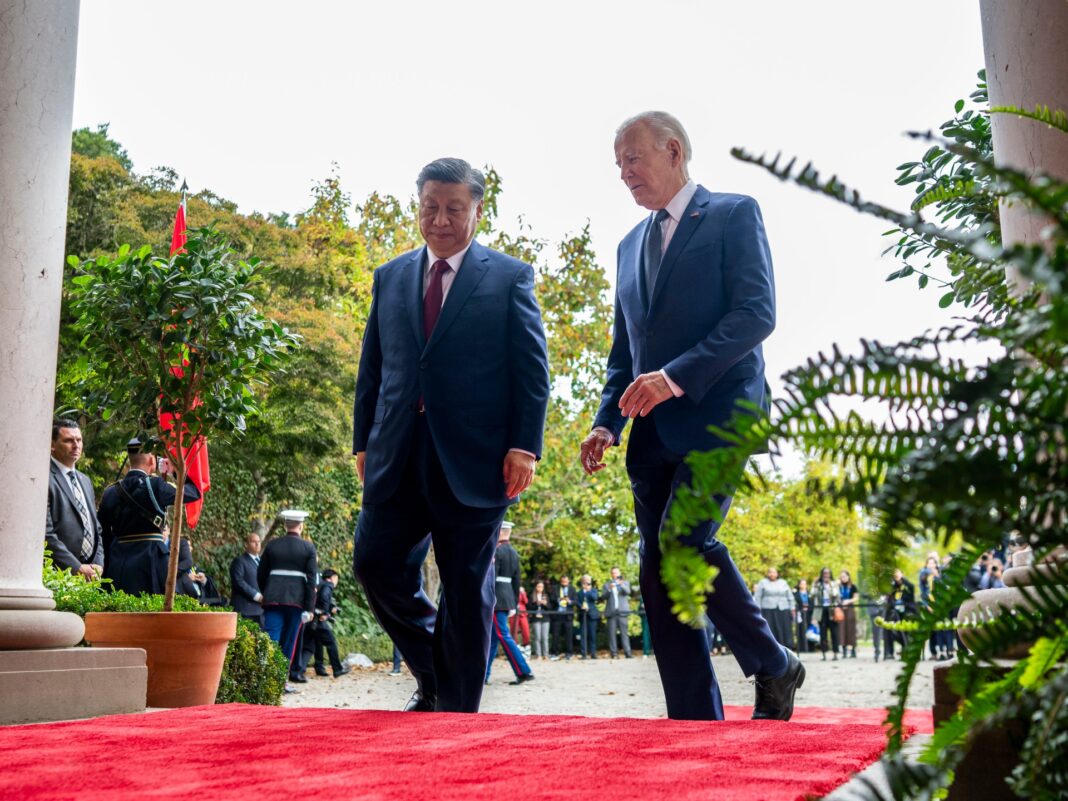United States President Joe Biden and his Chinese counterpart Xi Jinping have had their first direct conversation since November, with officials describing their talk as “constructive”.
But details from Tuesday’s phone call hinted at long-running tensions between China and the US, with Xi calling questions of sovereignty in Taiwan a “red line” not to be crossed.
The leaders last spoke on the sidelines of the 21-member Asia-Pacific Economic Cooperation (APEC) summit in California in November, with both sides hailing progress while remaining at loggerheads over issues like Taiwan and technology development.
Speaking to reporters on background on Tuesday, a US official said the call was meant to be more of a “checking in” and was not necessarily meant to achieve any policy breakthroughs.
“The two leaders held a candid and constructive discussion on a range of bilateral, regional, and global issues, including areas of cooperation and areas of difference,” the White House said in a statement following the call.
Xi, meanwhile, told Biden that the two countries should adopt a baseline principle of “no clash, no confrontation” for the year, according to state broadcaster China Central Television (CCTV).
“We should prioritise stability, not provoke troubles, not cross lines but maintain the overall stability of China-US relations,” Xi said, according to the broadcaster.
The call precedes several weeks of diplomacy, with US Treasury Secretary Janet Yellen set to travel to China this week and Secretary of State Antony Blinken to follow in the weeks ahead.
The White House said Xi and Biden addressed a laundry list of subjects, “including counternarcotics cooperation, ongoing military-to-military communication, talks to address AI-related risks and continuing efforts on climate change and people-to-people exchanges”.
“We believe there is no substitute for regular communication at the leader level to effectively manage this complex and often tense bilateral relationship,” said White House National Security Advisor John Kirby in a press briefing on Tuesday.
The talks come after months of heightened tension: The US military, for instance, has highlighted “near-miss” incidents, where ships in the Taiwan Strait nearly collided and fighter jets have come dangerously close to one another, as part of aggressive manoeuvring.
Both the US and China operate in several key areas in the Pacific, including the South China Sea, East China Sea and the Taiwan Strait, and any collision could lead to an escalation in tensions.
The Biden administration has made countering China’s increasing military and economic “assertiveness” in the region a key pillar of its foreign policy. It has also sought to shore up military alliances while maintaining trade restrictions on Beijing.
Next week, Biden will host Philippines President Ferdinand Marcos Jr and Japanese Prime Minister Fumio Kishida at the White House. China’s influence in the region is set to be at the top of the agenda.
Beijing has said US limits on advanced technology transfers and the sanctioning of Chinese businesses have put undue strain on China’s economy. Xi told Biden that such measures are “not de-risking but creating risks”, according to CCTV.
The US House of Representatives, for instance, recently took actions against the China-based company ByteDance. Last month, it called for ByteSance to sell its US-based operations within six months, or see its marquee product — the social media app TikTok — banned within the country.
House leaders said the measure was aimed at preventing user information from being passed to the Chinese government, leading to potential threats to national security. Biden has signalled his willingness to sign such a bill.
The House bill has yet to pass the Senate, however. If it were to be signed into law, the bill would likely face legal challenges in the US over free speech concerns.
The White House acknowledged that the question of a TikTok ban was raised in Tuesday’s call.
Another issue looming over the conversation was Taiwan, an island China claims as its own.
On Tuesday, Biden “emphasised the importance of maintaining peace and stability across the Taiwan Strait and the rule of law and freedom of navigation in the South China Sea”, according to the White House.
Taiwan has long been a point of contention between the US and China. The US “acknowledges” the “One China” policy and does not openly support Taiwan’s independence. But while the US does not have formal relations with the Taiwan government, it sells weapons to the island, and Biden himself has pledged to defend it should the territory face a Chinese invasion.
Heightening tensions is the fact that Taiwan held a vote in January, electing Vice President William Lai Ching-te to be its next president. Lai is a longtime supporter of independence for the self-governing island, and he is scheduled to take office on May 20.
In January, China’s Ministry of National Defence said military officials stressed during a meeting with US counterparts in Washington, DC, that Beijing “will never compromise or back down on the Taiwan issue”.
Chinese Foreign Minister Wang Yi said later that month that “Taiwan independence” posed the biggest risk to relations between the two countries.
Other international conflicts were also brought up in Tuesday’s call. Biden, for instance, raised concerns over China’s “support for Russia’s defence industrial base” amid Russia’s ongoing war in Ukraine.
Observers have said Beijing appears more willing to lower tensions with Washington as its economy faces a troubling outlook.







